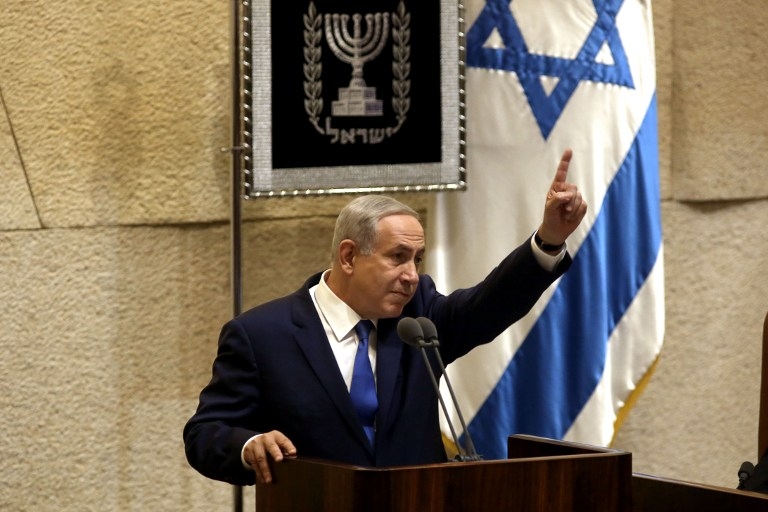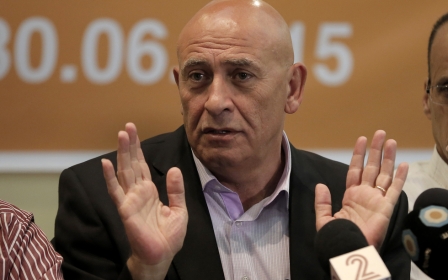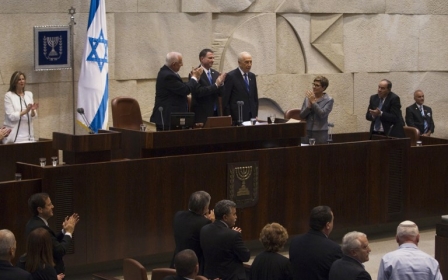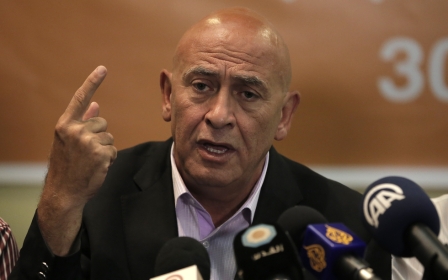Netanyahu's bill to suspend Knesset members passes first vote

A controversial bill targeting Palestinian members of the Israeli Knesset that would allow the parliament to vote to suspend members for inappropriate behaviour passed its first reading on Monday night.
The bill, which was conceived by Israeli Prime Minister Benjamin Netanyahu following the visits of three Palestinian members of the Knesset (MKs) to the families of Palestinians killed in alleged attacks in occupied east Jerusalem last month, was passed by 59 votes to 53.
“This law is meant to suspend from the Knesset those MKs who stand behind terror,” Netanyahu told his Likud faction on Monday. “I’m expecting all those who say they support the law to vote for it.”
The bill is an amendment to existing parliament rules under which grounds for suspension include incitement to violence or racism, support for armed conflict or a terrorist group against Israel, and opposing Israel as a Jewish and democratic state.
If passed, the bill would allow the Knesset to remove a sitting MK until the end of the parliament’s term or for a shorter period of time.
The proposed procedure for suspension entails an initial complaint submitted by 61 parliamentarians to the Knesset House Committee, which then requires a vote of 90 MKs, or three-quarters of the House Committee to approve the vote on suspension for “behaviour not appropriate to his position as a member of Knesset” as well as determining the length of the suspension.
During the suspension period, the MK would be replaced by the next person on his party’s electoral list.
Nissan Slomiansky, a member of the right-wing Jewish Home party, presented the bill and said: "There are borders to democracy."
According to Knesset legal adviser Eyal Yinon, the bill must pass two more readings to become law, citing that the High Court of Justice might be inclined to invalidate it if it was not passed by a majority on all three readings.
If passed, the bill would not be effective retroactively, meaning the three Palestinian MKs who prompted its tabling in parliament – Haneen Zoabi, Jamal Zahalkah, and Bassil Ghattas from the Balad faction – would not be subject to it.
The Knesset Ethics Committee already suspended the three legislators from all Knesset activity except voting in February for two to four months.
In a committee meeting about the bill last month, the Palestinian-dominated opposition Joint List chairman Ayman Odeh said that the faction’s MKs would resign from the Knesset if it became law.
During the prolonged debate, the Joint List MKs argued that they remained committed to human rights and democracy.
“I will do all I can to uproot phenomena of fascism and racism and exclusion,” they each said in turn. “I will continue to fight the occupation of the Palestinian people and for peace, and will continue to act for social justice and equality.”
Israel's Haaretz newspaper said there was a "general consensus in both the coalition and the opposition that the Knesset would have a hard time implementing the law if it ever passes".
The bill’s second and third readings are due to take place on 3 May when parliament resumes after the Passover recess, which begins on 1 April.
New MEE newsletter: Jerusalem Dispatch
Sign up to get the latest insights and analysis on Israel-Palestine, alongside Turkey Unpacked and other MEE newsletters
Middle East Eye delivers independent and unrivalled coverage and analysis of the Middle East, North Africa and beyond. To learn more about republishing this content and the associated fees, please fill out this form. More about MEE can be found here.




